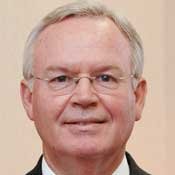As chief administrative officer for the University of Mississippi Medical Center, David Powe oversees the daily operations of an economic powerhouse. The center represents 10 percent of the Jackson metro area's economy, and its clout is only growing. Six years ago, when Powe took over as CAO, UMMC reported annual revenues of $686 million. This year, the center is on track for $1.2 billion in revenue.
Powe, 62, has an easy manner that betrays his background as a school social worker. He grew up in Tylertown, Miss., and earned his bachelor's and master's degrees from Mississippi State University. He received his doctorate in education administration from the University of Southern Mississippi and served as superintendent of McComb Public Schools and president of Mississippi Delta Community College before jumping to NASA, where he spent 12 years as director of the environmental sciences program.
What's the scope of your job?
We deal very specifically with the operations of the center, whether it's safety, security, facilities. Each one is so massive, because we're the second-largest employer in the state of Mississippi. We have 17,000 to 20,000 people come through every day.
How has UMMC's relationship with the city changed?
Jackson right now is experiencing a renaissance, a growth, and sort of shining off that star as a capital city … creating this new urbanism that you see in lots of other cities. This is where we come in—if you go to lots of other cities you'll see a medical complex similar to ours located in that city or on the periphery. They have developed the academics, they've developed the clinical, but they've also developed a strong research component. And so in doing that they have brought lots of professionals in and lots of students in. These are people who are used to the new urbanism. We can see that developing here.
Not only do we have to be business people here, we have to have good business partners. One prime example of this, as we grow the School of Medicine, for each student we put in here, we need a faculty member—a one-to-one ratio, because of the specific and high-skilled training that's required. So we need the business people, the growth in the community in order to recruit the best faculty members. That means we've got to help this community grow. It's tremendous to have the support of the developers here.
You're going to step up as chairman of the Jackson Chamber of Commerce next year. What are your goals?
The Jackson Chamber has had some real pioneers. You have Sylvia Stewart, Bill Cooley, Socrates Garrett, David Pharr, Jonathan Lee, and I'm humbled to even follow these people because they've done such a wonderful job at pulling people together. What they've done is really honed in to the areas of concern and the areas that need improvement so that we can all rise together. What I'm going to do is build on that.
What should Jacksonians know about the Medical Center?
What we're attempting to do here is get people to understand that the economic impact of the Medical Center is far and wide. As identified as a target industry, we impact the entire state of Mississippi. By placing our physicians in 80 of the 82 counties in the state, we impact the entire state. As (we) locate a physician in a local community, the data indicates that (we) create approximately 26 jobs. This is not just in their office, (it) increases the dollars that go to pharmacists, for health care at the hospitals, nursing homes, all over that community. They generate around $2.5 million annually by setting up that practice. Today, we have over 2,500 of our graduates around the state. If you total all of those up, it's $3.3 billion in revenues that are generated by our graduates.
Do you know a Jacksonian or Mississippian who should be the JFP Person of the Day? Briefly tell us his or her story, sending it to [e-mail missing]. Please include contact information and a picture, if possible.



Comments
Use the comment form below to begin a discussion about this content.